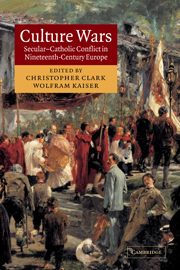Book contents
- Frontmatter
- Contents
- List of illustrations
- List of contributors
- Introduction: The European culture wars
- 1 The New Catholicism and the European culture wars
- 2 ‘Clericalism – that is our enemy!’: European anticlericalism and the culture wars
- 3 ‘Priest hits girl’: on the front line in the ‘war of the two Frances’
- 4 The battle for monasteries, cemeteries and schools: Belgium
- 5 Contested rituals and the battle for public space: the Netherlands
- 6 Nonconformity, clericalism and ‘Englishness’: the United Kingdom
- 7 The assault on the city of the Levites: Spain
- 8 Roma o morte: culture wars in Italy
- 9 Enemies at the gate: the Moabit Klostersturm and the Kulturkampf: Germany
- 10 Village quarrels and national controversies: Switzerland
- 11 The Counter-Reformation's last stand: Austria
- 12 The uncivil origins of civil marriage: Hungary
- Annotated bibliography
- Index
1 - The New Catholicism and the European culture wars
Published online by Cambridge University Press: 23 July 2009
- Frontmatter
- Contents
- List of illustrations
- List of contributors
- Introduction: The European culture wars
- 1 The New Catholicism and the European culture wars
- 2 ‘Clericalism – that is our enemy!’: European anticlericalism and the culture wars
- 3 ‘Priest hits girl’: on the front line in the ‘war of the two Frances’
- 4 The battle for monasteries, cemeteries and schools: Belgium
- 5 Contested rituals and the battle for public space: the Netherlands
- 6 Nonconformity, clericalism and ‘Englishness’: the United Kingdom
- 7 The assault on the city of the Levites: Spain
- 8 Roma o morte: culture wars in Italy
- 9 Enemies at the gate: the Moabit Klostersturm and the Kulturkampf: Germany
- 10 Village quarrels and national controversies: Switzerland
- 11 The Counter-Reformation's last stand: Austria
- 12 The uncivil origins of civil marriage: Hungary
- Annotated bibliography
- Index
Summary
The history of Catholic societies in nineteenth-century Europe was marked by the paradoxical intertwining of two transformative processes: secularisation and religious revival. On the one hand, church properties were seized and sold off; ecclesiastical privileges were removed; clerical authorities came under pressure to retreat from their positions in education and charitable provision; and liberal, national, radical and socialist political discourses were marked by an uncompromisingly anticlerical rhetoric. At the same time, however, this era saw a flowering of Catholic religious life across Europe. There was a proliferation and elaboration of popular devotions, church buildings, religious foundations and associations, and confessionally motivated newspapers and journals. This revitalisation of religious energies coincided with profound changes within the church itself. The New Catholicism of later nineteenth-century Europe was more uniform, more centralised, and more ‘Roman’ than the eighteenth-century church had been. It was marked by a convergence of elite and popular devotions, an interpenetration of lay and clerical organisation, a rhetorical vehemence and a resourcefulness in the management of communicative media that impressed contemporaries, whether sympathetic or hostile.
These transformations were a crucial precondition for the ‘culture wars’ that polarised European societies in the later nineteenth century. There had always been intermittent friction and conflict between church and state in western Europe. But the all-encompassing ideological and political struggles of the later nineteenth century would have been inconceivable had the church not acquired the means to mobilise its support base and to mount effective campaigns against its adversaries.
- Type
- Chapter
- Information
- Culture WarsSecular-Catholic Conflict in Nineteenth-Century Europe, pp. 11 - 46Publisher: Cambridge University PressPrint publication year: 2003
- 66
- Cited by



